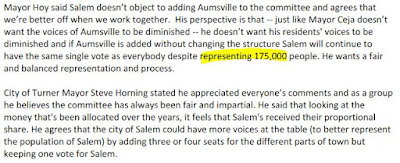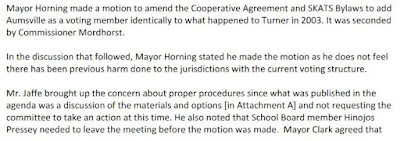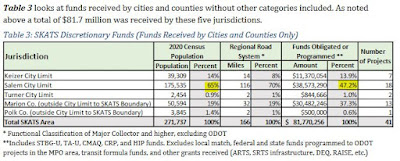On Tuesday the 26th, at the MPO is a showdown on how to admit Aumsville.
 |
| Showdown! |
The conversation and debate last month led up to this.
Since at least June of last year it has been known that the Feds had ruled that Aumsville was going to be joining the metropolitan area for the MPO. So how to add them? There was some flexibility on this part. The most simple way, and the way that was used 20 years ago when Turner was to join, was to give Aumsville a single representative and vote on the Policy Committee. This is to take the mode of the US Senate rather than the US House, a mode that gives very small jurisdictions and their residents the same voting weight as very large jurisdictions and their residents.
The City of Salem and Cherriots are interested in rebalancing things with a somewhat more proportional representation.
In February the Mayor of Aumsville, with 4,200 residents, said that "the city of Aumsville's voice will be diminished if Salem is provided additional votes."
 |
| One vote for 4,200 residents vs. 175,000 |
Mayor Hoy pointed out that Salem has 175,000 residents, whose voice is very diluted if they have the same voting weight as the 4,200 of Aumsville. Mayor Hoy asked for "fair and balanced representation."
 |
| 175,000 residents vs. 4,200 |
Councilor Philips offered some additional math: "the city of Salem is equal to 42 'Aumsvilles'."
 |
| Salem = 42 Aumsvilles in population |
The Mayor of Turner asked if Salem had had two votes, what would have been different.
And then tried to make a motion to bring Aumsville into the MPO without any change, "identically to what happened to Turner in 2003."
 |
| Turner makes the motion |
That motion was out of order last month, and now, introduced properly for this March meeting, MPO members will formally — so formally MPO staff are requiring a tight compliance with Parliamentary procedure — consider the motion.
From here it seems like getting hung up on the question, "if Salem had two votes, what would have been different" is a red herring.
From here the voting structure and board culture operated with a prior kind of tacit chilling so that analyzing votes themselves is not clarifying. The board culture overvalued consensus and has been always for unanimous votes, even when they were not required.
A previous representative from Marion County would routinely threaten to leave the room instead of casting a "no" vote on certain matters. This did not make a vote impossible, but it was a kind of stink and friction. They were friendly about it, but it was friendly in an aggressive, ironic way, a kind of "nice unanimous vote you got there, be a shame if anything happened to it. I'll work with you this time..."
 |
| Example of unanimity where it was not needed |
A desire to preserve collegiality and sometimes just fake amity meant that items on which there might have been a divided, non-unanimous vote were removed or modified. The minutes, month after month, and the meetings themselves, have this big show of unanimous votes.
The chilling operated to ensure there have never been votes on which a second Salem vote might have changed things.
So by focusing on actual votes, it is very difficult to discern ways that underrpresentation for Salem has harmed Salemites.
There is the aggregate disproportion of funding in which a bias is visible.
 |
| Disproportion with Cherriots and regional projects |
 |
| Disproportion w/o Cherriots and ODOT |
And there is one specific item that comes to mind on which a chilling was distinctly visible.
 |
| Opposing climate at the MPO (April 2018 PC minutes) |
Back in 2018 the City of Salem tried to strengthen Goal 7 on the environment in the 2019 Regional Transportation System Plan that was then being developed.
This was an instance where the non-representative, anti-urban structure of the MPO harmed the City of Salem and its goals.
The thing is, a stronger Goal 7 never got to an up-and-down vote. Goal 7 got watered down to where it was satisfactory to the denialists, and then the modified version was voted on. It won broad approval of course.
 |
| Not just here (Brookings Institution, 2006) |
The problem with the governance structure is not just simply a matter of votes. It's also a matter of the culture on the committee and determining the prior question of what even gets to a vote. In order to preserve unanimity, contested votes are avoided, and the small, ruralish jurisdictions enjoy an ostensibly collegial de facto veto power.
Salem should have fairer representation on the governing committee for the MPO. But it is difficult to make that case by appealing to a specific set of votes on which an additional vote for Salem would have made a difference. It's more a matter of the general tenor and approach of the committee. It's more about "board culture" and general MPO priorities, really, than about strict votes. The board should move away from the stifling insistence on consensus and tolerate more divided, contested sentiment and votes.
If the motion on the table is defeated, some kind of substitute motion for a longer, "facilitated" process very possible. (Aumsville is going to join; the question is on the details.)
Previously on proportional representation after the Goal 7 debate in 2018:
- "Updating the Public Participation Plan" (2021)
- "Thinking about Governance Structure and Cost Escalation" (June 2023)
- "How to add Aumsville" (July 2023)
- "Maps, Aumsville, and Voting Structure" (August 2023)
- "What is Equitable and Proportional Representation? At the MPO" (November 2023)
- This year, "Funding Pie Slices and a Front Street Project: At the MPO" (January)
And elsewhere:
- The 2006 Brookings Institute paper from which the chart above is excerpted, "An Inherent Bias? Geographic and Racial-Ethnic Patterns of Metropolitan Planning Organization Boards"
- And a 2019 discussion at the national Safe Routes to School Partnership, "Metropolitan Planning Organizations and Health 101," which in turn cites it.
The Policy Committee meets on Tuesday the 26th at noon. The agenda and meeting packet can be downloaded from the meeting announcement here.


No comments:
Post a Comment